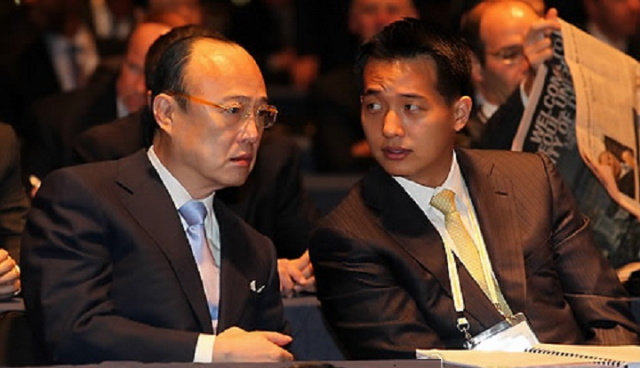Targeting the 1,200 trillion private market
Hanwha Group’s space industry integration
‘Space Hub’ officially launched
Launch vehicle, satellite, communication technology, etc.
Expecting synergy with affiliates’ majors
 viewer
viewer
Hanwha Group launches the’Space Hub’, which leads the space industry technology scattered across several affiliates, and enters the space industry in earnest. The baton of fostering the space industry is held by Hanwha Solutions President Kim Dong-gwan, the eldest son of Hanwha Chairman Seung-yeon Kim. From solar and hydrogen, the group’s new growth engines, to aerospace, President Kim is in charge.
Hanwha announced on the 7th that it has officially launched the’Space Hub’, an organization that will lead the entire space industry. President Kim was recommended as a registered executive of Hanwha Aerospace on the 26th of last month. The team leader at Space Hub is his first seat.
 viewer
viewer
The hub organization was organized around Hanwha Aerospace engineers. Hanwha Systems’ communications and imaging equipment specialists, Hanwha’s weapons system specialists, and Hanwha Aerospace’s recently acquired private satellite company Setrec-I are also expected to participate in the future. Hanwha Group explained, “The Space Hub is not an organization at the top of each company, but a comprehensive situation room for the space sector full of realism.”
Space Hub plans to monitor trends in overseas private space projects and set research directions and business models in the future. In addition, it focuses on research and investment by dividing into the fields of production such as launch vehicles and satellites, and services such as communication, earth observation, and energy. It is also planning to actively recruit talents in the space field. President Kim said, “I saw that in order to compete with world-class companies, we need expertise and full support,” and “I will find a shortcut to space with engineers.”
The birthplace of Space Hub is the’Space Task Force (TF)’ created by President Kim in November of last year. Since then, President Kim has served as TF leader and has been making efforts to expand the value chain of the satellite business by dividing space as the company’s new growth engine.
The reason why Hanwha pioneered space is because the competition for space development centered on large satellites and launch vehicles led by the state is being pushed back to the’old space’ and’new space’ led by the private sector is unfolding. The space market is growing rapidly as electronic equipment advances and small and micro satellites can do what large satellites did in the past. Morgan Stanley predicts that the space industry market will grow to about 1.1 trillion dollars (about 1,220 trillion won) in 2040, led by private companies.
Space Hub has a space service business in mind that combines flagship technologies among affiliates. Hanwha Aerospace’s launch vehicle is equipped with the satellite of Setrec Eye and the communication system of Hanwha Systems.
In particular, analysts say that adding Setrec I’s small satellite design technology to Hanwha Systems’ communication system technology will allow Elon Musk’s SpaceX to enter the’space Internet’ field where Amazon competes. Hanwha Systems has expanded its space satellite business territory by investing in advanced foreign companies related to’satellite communication antenna’, a core technology that will realize the space Internet.
It is also considering linking with solar power, the group’s growth axis. An official from Hanwha said, “We will also study ways to link the solar technology of Hanwha Solutions, the No. 1 solar module market in the United States, and the technology of Shimaron, an American hydrogen and space tank company acquired by Hanwha Solutions, with the space business. I will.”
Hanwha Group will not spare any investment to secure global competitiveness in a short period of time. Considering that SpaceX has invested 500 billion won in the development of the Falcon 9 launch vehicle, it is expected that an astronomical cost will be incurred. An official at Hanwha said, “We are considering the specific investment scale,” and said, “We believe that financial resources will need government support in order to secure national technology in addition to our own private investment.”
/ Reporter Han Dong-hee [email protected]
< 저작권자 ⓒ 서울경제, 무단 전재 및 재배포 금지 >
